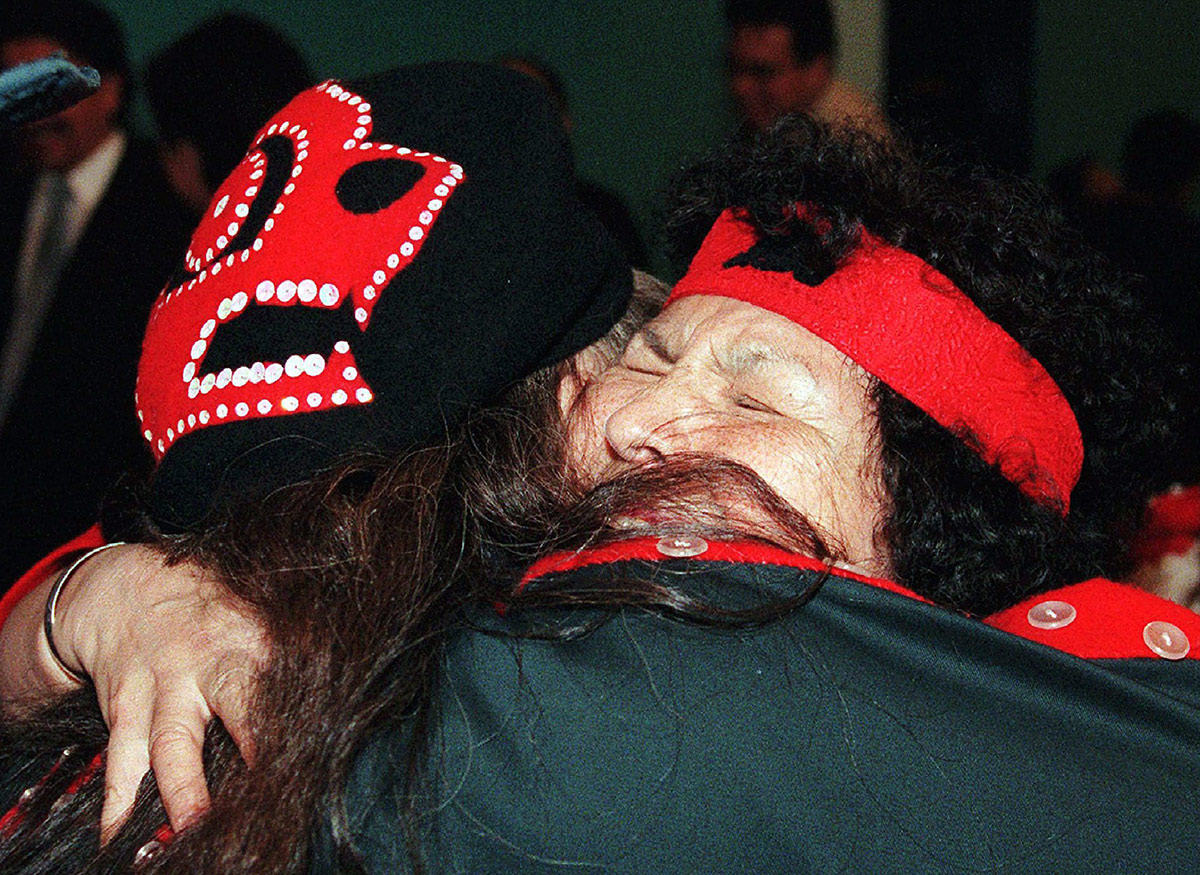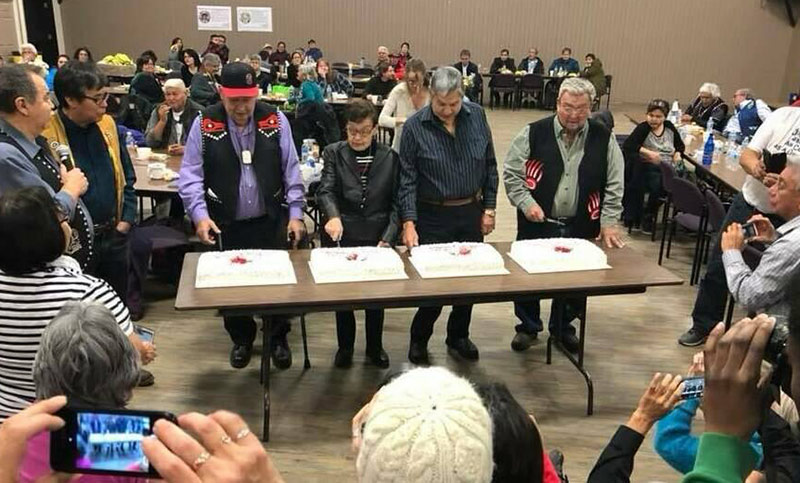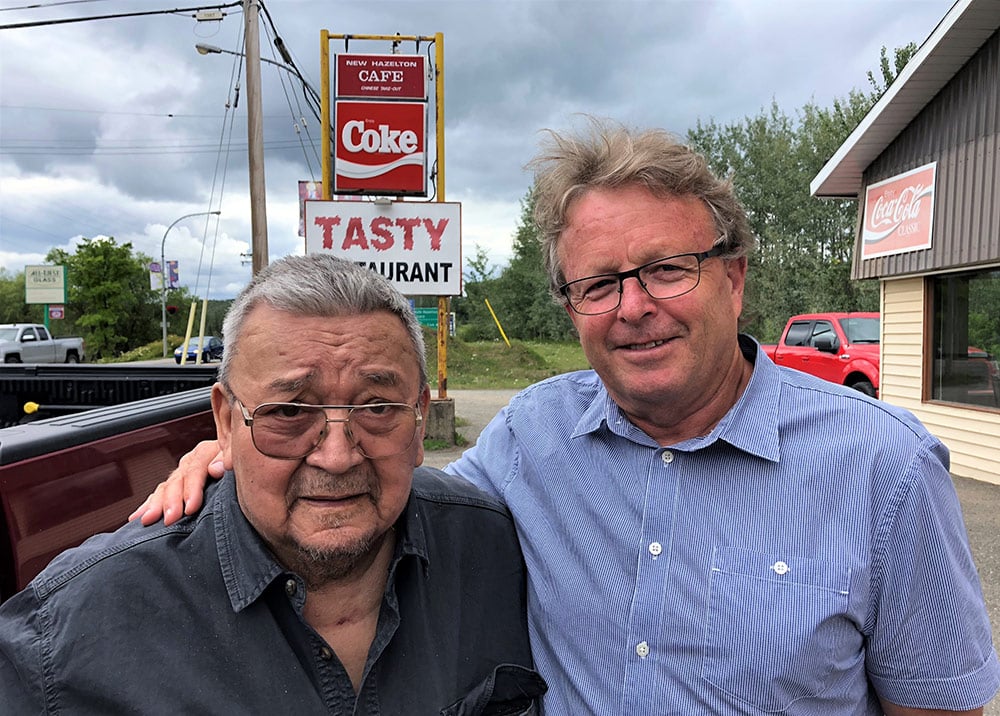They laid Delgamuukw to rest last week.
That’s Delgamuukw Earl Muldoe, a legendary Gitxsan Hereditary Chief and first named plaintiff in a 1997 court decision that putatively changed the fortunes of Indigenous peoples in Canada forever, and for the better.
Delgamuukw, the man, was 85-years-old when he died on Jan. 3. He had been in poor health for a few years, said his nephew, Hup-Wil-Lax-A Kirby Muldoe.
“He was a well-known, powerful man respected for his art and for his commitment to human rights.”
They laid Delgamuukw to rest last week. The man, but not the name, which has been passed down through the hereditary system of Gitxsan governance for thousands of years and will be passed down again, this time to Kirby’s father, George Muldoe.
“He was blanketed on Friday at Delgamuukw’s funeral,” Muldoe said, referring to a ceremony that began a process through which his father will officially take up the chieftainship in about a year, after first putting up a headstone to honour his late brother, and holding a feast in his name.
Delgamuukw’s death comes at a pivotal time for the Gitxsan and the Wet’suwet’en people, who are their immediate neighbours and were co-plaintiffs in the Delgamuukw court case.
Both nations have been deeply divided by resource developments in or passing through their territories, none more so than the Coastal GasLink pipeline project, whose right of way has cleaved a deep scar on the land and on the people who call it home.
As at the Fairy Creek logging blockades in the southwest corner of Vancouver Island, the RCMP have maintained a violent, government-approved enforcement of industrial development in the region that is the very antithesis of what the Supreme Court of Canada envisioned when it handed down a judgement that delighted Indigenous peoples the world over a generation ago.
The shorthand version of the Delgamuukw v. British Columbia decision is that it was the first time Canada’s highest court ruled that Indigenous peoples in B.C. had rights that had not been extinguished, thus overturning a lower court ruling saying that any rights First Nations had over the land were legally dissolved when British Columbia became part of Canada in 1871.
The Supreme Court confirmed that oral testimony was as legitimate as other forms of evidence. It stated that Indigenous title rights include not only land, but the right to extract resources from the land in ways consistent with traditional practices.
The court said title is inalienable and ancestral, although it did not grant title to either nation due to a technicality with the pleadings. Title would have to be proven separately and specifically, but the court urged the parties not to pursue further legal remedies, but to negotiate. Presumably it had in mind that the governments of Canada and B.C. would negotiate in good faith.
At the opening of a trial that spanned three years of testimony, it was a Wet’suwet’en Chief Gisday'wa Alfred Joseph who rose first to tell B.C. Chief Justice Allan McEachern that all 54 plaintiff Chiefs — Gitxsan and Wet’suwet’en alike — represented Houses through which their peoples’ ancient relationship to the land was managed and their authority over their territories was maintained.
“That authority is what makes the Chiefs the real experts in this case,” Gisday'wa said.
Delgamuukw rose and told McEachern, “My power is carried in my House’s histories, songs, dances and crests. It is recreated at the Feast when the histories are told, the songs and dances performed, and the crests displayed. With the wealth that comes from respectful use of the territory, the House feeds the name of the Chief in the Feast Hall. In this way, the law, the Chief, the territory, and the Feast become one. The unity of the Chief’s authority and his House’s ownership of its territory are witnessed and thus affirmed by the other Chiefs at the Feast.”
Through 318 days of evidence and 56 days of closing argument, McEachern expressed his impatience with oral testimony, even claiming to have a “tin ear” for cultural matters when one plaintiff sought to sing her testimony. He sidelined evidence presented through special Oral Histories known as adaawk and kungax. He infamously cited Thomas Hobbes in his final judgement by describing the pre-colonization lives of Gitxsan peoples as “nasty, brutish and short.” He basically invited Indigenous people to dismantle their Houses and get on board the Euro-Canadian train. His decision perfectly embodied the capitalist, racist, violent and triumphalist attitudes of the Canadian establishment. Thankfully, the Court of Appeal and the Supreme Court of Canada saw things differently.

But in the wake of Delagmuukw, the court case, how different are things, really?
Legally, the case has been heavily relied upon, most successfully in the awarding of the first declaration of Aboriginal title in Canadian history to the Tsilhqot’in Nation in 2014. The case was also a big spur for treaty negotiations, since confirmation that title had not been extinguished across the board gave nations that wanted to do so a basis to negotiate an effective surrender of title in exchange for other rights and compensation.
In the case of the Gitxsan and Wet’suwet’en, the euphoria of the 1997 court victory was short-lived. The court case had exhausted everybody. It had cost millions of dollars. And now, to achieve its full effect, they needed to pursue a title case to prove that the rights they’d just won for all non-treaty First Nations applied to their territories, and to them.
Richard Overstall, who has worked with the Gitxsan and Wet’suwet’en people for nearly four decades in various capacities and currently as a litigation lawyer, told me, “Negotiation of a settlement was encouraged by the court and welcomed by the people after the financial and emotional stress of the long, drawn-out trial and the bitterness engendered by the relentless attacks on their society, legal order and the integrity of their Chiefs by the provincial and federal lawyers under the adversarial process.
“It was in the governments’ interests to keep the negotiation pot bubbling away by pumping money into it but to not concede an inch from their parsimonious interpretation of the Delgamuukw and subsequent court decisions.”
It was also in the interests of band councils, their bureaucrats and a bottomless pool of consultants to take money to negotiate short-term deals that promised lavish community benefits in exchange for access — something that has never been proven true.
Yet by not conceding an iota of authority back to the House system, the hereditary system, the system that formed the basis for all the testimony that was presented at trial and which, theoretically at least, was affirmed by Canada’s courts appellant and supreme, successive federal and provincial governments have brought dishonour to the Crown and their own courts and have disrespected thousands of years of Indigenous law in the bargain.

“Together, the Gitxsan and Wet’suwet’en Chiefs own and govern the 22,000 square miles of Gitxsan and Wet’suwet’en territory,” Delgamuukw told the trial judge back in 1987. Those territories hold riches of their own, and, by the simple fact of where they are, serve as a kind of resource funnel though which — by rail, road or pipeline — many of Canada’s primary products reach tidewater in the ports of Kitimat or Prince Rupert.
In the intervening third of a century since Delgamuukw said his piece, those riches and that access have been exploited as if the trial never happened, as if those voices were never heard, as if the Delgamuukw decision was never rendered. If anything, things have gotten worse.
“We have to breathe life back into Delgamuukw/Gisday'wa,” Chief Na’Moks John Ridsdale told me. He believes it was a mistake not to pursue a title case, one he feels both nations would have won then, and still would now.
“We never intended on being a treaty nation,” Na’Moks said of the Wet’suwet’en. But without the capacity or the energy to pursue a title case, they were “led into very long and unproductive discussions in the treaty process. It was the only vehicle available,” yet ultimately it took them nowhere, “as the process was set up for us to lose our authority as well as in excess of 80 to 90 per cent of our lands.”
Now, he says, governments insist on “clarity on what constitutes the nation’s Indigenous Governing Body. For us, it has always been and always will be our hereditary system, our House groups and Clans who the Hereditary Chiefs represent.”
Na’Moks and Hup-Wil-Lax-A scoff at mention of the United Nations Declaration of the Rights of Indigenous Peoples, which the Canadian and B.C. governments have sworn to uphold. Were they to implement that declaration in good faith, it would entirely rule out developments like Coastal GasLink that have been imposed on the Wet’suwet’en against the wishes of hereditary leaders, and have to be enforced by gun-toting police in the pay of Canadian taxpayers.
In the years since Delgamuukw was decided, governments have deliberately neutered its principles and sought, successfully, to ensure certainty to industry of its rights at the expense of continued uncertainty for Indigenous people when it comes to theirs. Some leaders, the late Delgamuukw among them, got paid to consent to industrial developments without following proper hereditary protocols. That might be to his shame, or maybe it speaks louder to the Hobson’s choice that Canada and B.C. continue to offer to non-treaty nations whose rights turn out to be no rights at all.
For better or worse, this year will mark the 25th anniversary of the Delgamuukw decision (on Dec. 11). It might be worth reflecting on what was said 10 years earlier when the trial began, when Gisday'wa said:
“Our histories show that whenever new people came to this land, they had to follow its laws if they wished to stay. The Chiefs who were already here had the responsibility to teach the law to the newcomers. They then waited to see if the land was respected. If it was not, the newcomers had to pay compensation and leave.
“The Gitxsan and Wet’suwet’en have waited and observed the Europeans for a hundred years. The Chiefs have suggested that the newcomers may want to stay on their farms in their towns and villages, but beyond the farm fences the land belongs to the Chiefs. Once this has been recognized, the court can get on with its main task which is to establish a process for the Chiefs’ and the newcomers’ interests to be settled. The purpose of this case then is to find a process to Gitxsan and Wet’suwet’en ownership and jurisdiction within the context of Canada. We do not seek a decision as to whether our system might continue or not. It will continue.”
Today, it seems only fair that if the Gitxsan and Wet’suwet’en wish to pursue title cases, the governments of Canada and B.C. should pay for them to do so. They’ve wasted millions in negotiations that haven’t changed things for the better and, in the wake of residential schools, have found unique new ways to traumatize another entire generation of people. The sad fact is that beyond the farm fences the land still “belongs” to the Crown, including the reserves where many Indigenous people continue to watch as their rights are eaten away.
If the governments of Canada are so sure of their rights as to enforce them at a cost of $20 million and counting, then they should at least have the courage to have those rights tested for once and for all. That way, governments and industry might finally get the certainty they claim to need to do their business. They might not like the outcome of course, because chances are the Gitxsan and Wet’suwet’en would get what they want, which is recognition of the authority over their lands that they deserve, and which is denied them to the enduring shame of all Canadians.
Farewell, Delgamuukw. Hail the honour his people have yet to be accorded, in his name or any other. ![]()
Read more: Indigenous, Rights + Justice, BC Politics
















Tyee Commenting Guidelines
Comments that violate guidelines risk being deleted, and violations may result in a temporary or permanent user ban. Maintain the spirit of good conversation to stay in the discussion.
*Please note The Tyee is not a forum for spreading misinformation about COVID-19, denying its existence or minimizing its risk to public health.
Do:
Do not: